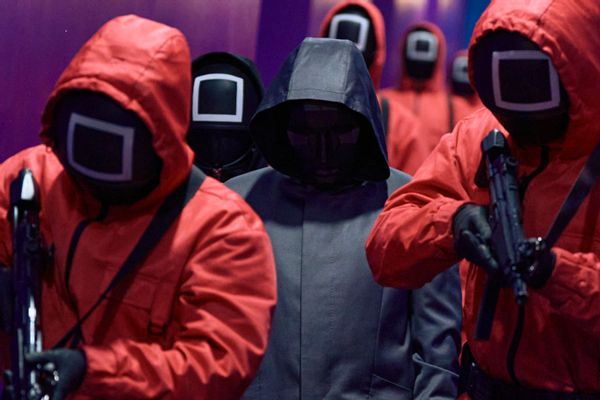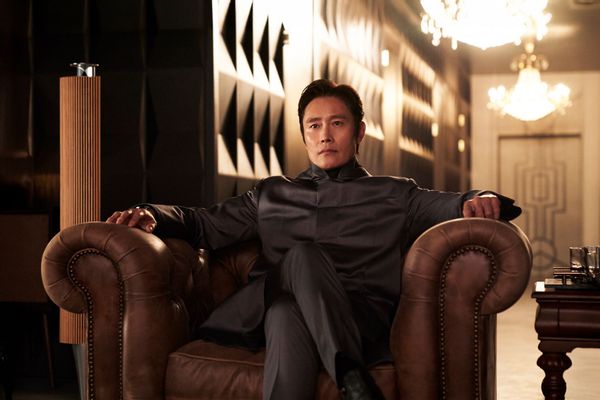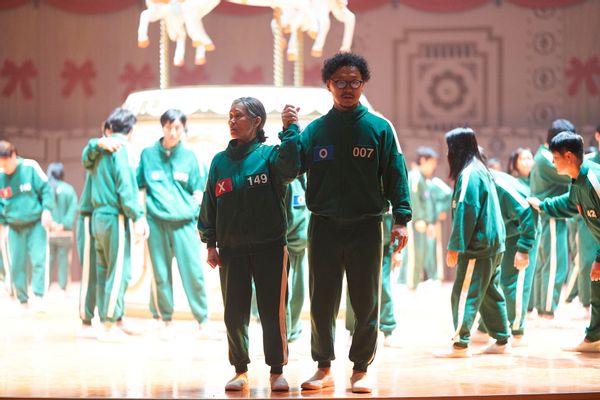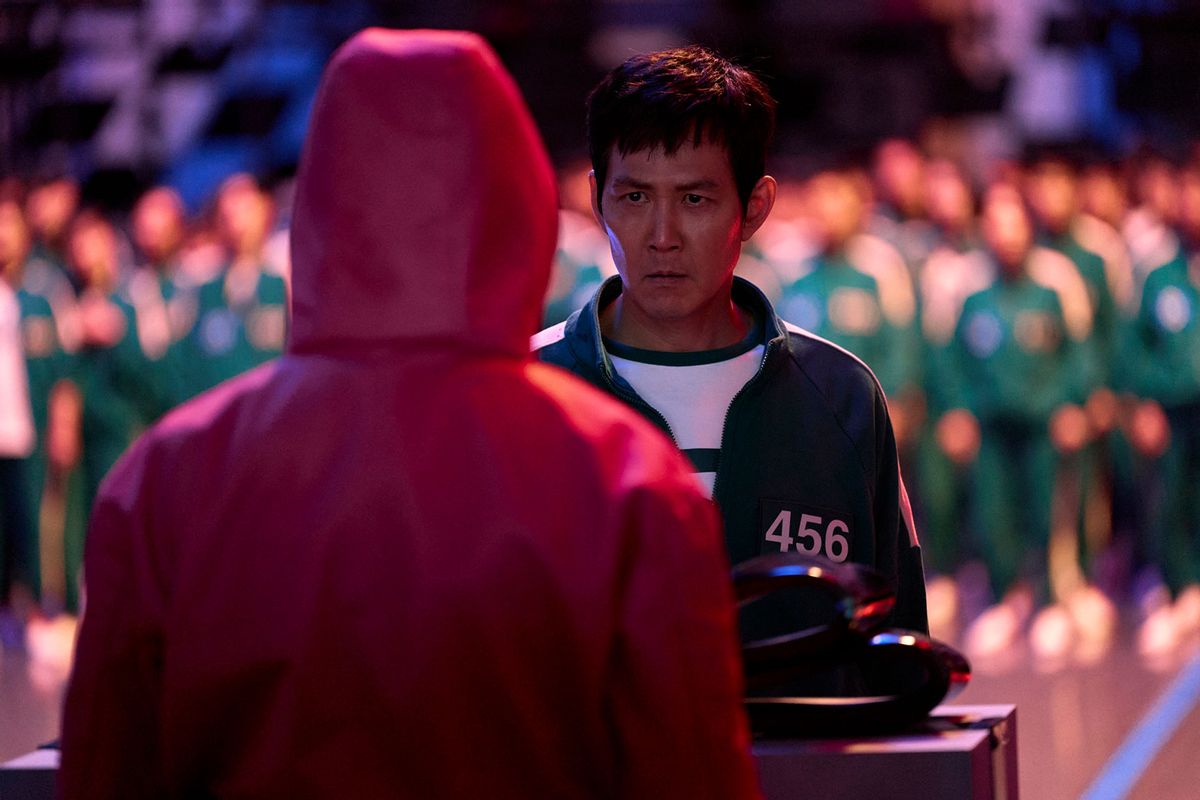Before Elon Musk effectively bought an American presidency, he mounted a hostile takeover of the attention economy. His initial bulk acquisitions were achieved by spreading misinformation, anger and fear to millions on his social media platform in exchange for their loyalty.
He simultaneously conned those he could reach using the Internet into believing his brain functions on a higher level than most people, persuading media entities with massive platforms to promote his illusion of genius. If it worked for a former NBC game show host, why not a guy who was invited to host “Saturday Night Live”?
“Squid Game” is a giant metaphor portraying the way late-stage capitalism siphons the labor, life force and health of the masses into the coffers of the rich.
All this preceded the individual investments made in the days leading up to Nov. 5, when Musk dangled $1 million giveaways to MAGA voters in swing states who signed a petition he claims was dedicated to protecting freedom of speech and the right to bear arms. That yielded dividends in the form of awestruck, worshipful fan posts on X and fawning coverage by right-wing news outlets.
If you’re wondering how this is relevant to "Squid Game," you either haven’t watched Season 1 or, equally as likely, missed the point director Hwang Dong-hyuk was trying to make.
Considering the violent deadly spectacle of the playground games with lethal consequences for losers and the twisted playhouse sets joined by a layered puzzle of staircases, that’s not hard to do.
The dominance of pink jumpsuits with black fencing helmets that following Halloween, along with green tracksuits and bedazzled animal heads, was a clue that many of us took away the wrong message. (Further proving this was the excitement that met the news of Netflix’s reality competition spinoff "Squid Game: The Challenge.")
Some might even view Seong Gi-hun's (Emmy winner Lee Jung-jae) transformation from a bowing and scraping, deeply indebted failure into a hardened champion, Player 456, as a Darwinian success story. Those are very popular these days. Extreme partisanship encourages that mode of thinking.
“Squid Game” is a giant metaphor portraying the way late-stage capitalism siphons the labor, life force and health of the masses into the coffers of the rich — and worse, how we’re willing to play the games the wealthy rig in their favor, even if it disadvantages other people like us.
To Gi-hun, so much winning is nothing to be celebrated. Some might spin his victory as evidence he’s better than people he outlived, including his childhood friend Sang-woo (Park Hae-soo). Gi-hun views it as the warped outcome of a system designed to relegate increasing numbers of people to a permanent state of indebtedness and poverty.
That moral is glaringly apparent in the second season, coming to us at a time when autocracies propped up by the obscenely rich are rising to power in multiple countries. The name of the world’s richest man isn’t uttered in this show, but the opening episode’s title, “Bread and Lottery,” is a synchronous acknowledgment that our present climate makes its fictional horrors possible.
“Squid Game” was a massive global success for Netflix, and there’s no reason to doubt “Squid Game 2” won’t command similar levels of worldwide attention. (Netflix is placing its bets on that, announcing this week a raft of branded partnerships with fast food chains and gaming platforms that’ll surround us with circles, triangles and squares long after the last Christmas lights are unplugged.)
 Squid Game (Netflix)This time Hwang needn’t linger too much on the games themselves, instead cutting more deeply into the psychology driving desperate people to wager their lives on a chance for easy money. This describes the players and the faceless underlings coldly murdering strangers and begging for their lives. They have their stories too.
Squid Game (Netflix)This time Hwang needn’t linger too much on the games themselves, instead cutting more deeply into the psychology driving desperate people to wager their lives on a chance for easy money. This describes the players and the faceless underlings coldly murdering strangers and begging for their lives. They have their stories too.
Some of those foot soldiers were once on the other side of the barrel, and for reasons that at least one explains, decided it’s more lucrative to serve these masters than cash out their 456 billion won (around $314.3 million) and jet off to a new life.
The oligarchs behind the curtain expect Gi-hun to do exactly that. Instead, he returns to Seoul and embarks on a mission to stop the game – if not by exposing it, then by force. Where the first season thrilled by setting personal drama within a meat grinder, “Squid Game 2” follows the structure of an action movie. Not just any action movie either — the sinister leader of the cabal Gi-hun sets himself against likens his vengeance quest to the central choice in “The Matrix.” They could have taken the blue pill and lived in peace but instead they still chose the red pill, he says of Neo and rest, to play the heroes.
“Do you think you’re a hero who can change the world?” he asks tauntingly.
Gi-hun has dropped off the grid and is gathering the strength to take on the game's makers, primarily the mysterious black-masked Front Man (Lee Byung-hun ) speaking for all the overlords. If he can’t take them down from the outside, he vows to chew apart their kingdom from within.
We need your help to stay independent
But the first season finale also reveals the Front Man is the lost brother sought by a secondary hero, police officer Hwang Jun-ho (Wi Ha-joon). This twist held a deeper meaning for some viewers than others. People familiar with Korean culture and history may have viewed the cliffside confrontation between Jun-ho and Lee’s In-ho as symbolic of the reality lived by families split by the border between North and South Korea, as author Marie Myung-Ok Lee explains in her 2021 story.
 Squid Game (Netflix)For others, the scene is a culmination of a subplot built around a character that boils down to a fly in the lair’s vents letting us tag along as he infiltrates control rooms, hallways and spaces that reveal the hive of worker drones running the place, including the ones siphoning organs off the fallen to sell on the black market.
Squid Game (Netflix)For others, the scene is a culmination of a subplot built around a character that boils down to a fly in the lair’s vents letting us tag along as he infiltrates control rooms, hallways and spaces that reveal the hive of worker drones running the place, including the ones siphoning organs off the fallen to sell on the black market.
Whatever contributed to the shallowness with which Wi’s character and others were written before is somewhat ameliorated in the second season. Less burdened with nurturing the tension of the functional premise of the game, Hwang puts aside writing a cluster of dramatic types to surround Lee and Wi to build memorable portraits.
One that garnered plenty of coverage is the choice to cast Park Sung-hoon, a cis male actor, to pla a trans woman named Hyun-ju who joins the game for the chance to fund her “gender-affirming surgery,” as Netflix’s notes describe the role. Hwang writes Hyun-ju as much more than this reductive explanation, and Park’s performance is thoughtful and affecting.
Even so, aside from the potentially harmful messaging communicated by this casting at a time when trans people and drag performers are under assault, Hwang also tumbles into the trope of making the most marginalized person in the story super-duper extraordinary.
More endearing are the connections she and others make as a matter of survival, but also because they aren’t entirely heartless. Kang Ae-sim and Yang Dong-geun portray an elderly woman and her failson who enter the tourney to erase his mountainous debt. The pairing could have been written as another cliché but Kang’s Jang Geum-ja is the kind of survivor that, in the real world, would have helped thwart a president’s attempted coup.
 Squid Game (Netflix)Wi gets to exercise a bit more command in his role similar to Gi-hun’s graduation to brooding savior – not that we’re complaining, Lee makes it look good on him. It’s an essential note in a chapter that both preaches mass resistance and cautions us that the obstacles to successfully upending an unjust system that preys on the poor and middle class are . . . us. As in, fellow members of the 99% who buy into the fantasy that the hyper-wealthy people are somehow more deserving of a good life than the rest of us.
Squid Game (Netflix)Wi gets to exercise a bit more command in his role similar to Gi-hun’s graduation to brooding savior – not that we’re complaining, Lee makes it look good on him. It’s an essential note in a chapter that both preaches mass resistance and cautions us that the obstacles to successfully upending an unjust system that preys on the poor and middle class are . . . us. As in, fellow members of the 99% who buy into the fantasy that the hyper-wealthy people are somehow more deserving of a good life than the rest of us.
“Squid Game 2” becomes a life-sized dollhouse collection of the modern era’s destructive vanities.
This season's miserably indebted is a gallery of overconfident consumers, ranging from a hip-hop artist with an overinflated sense of his fame (played with sinister verve by Korean rap star Choi Seung-hyun, aka BigBang's T.O.P.) to a cryptocurrency huckster, from a businessman who borrows against his overconfidence to a young man eager to play soldier. This season allows us to get to know more of them beyond a few quirks or twirls of the figurative mustache, although there’s a share of that. But more are developed amply enough to give their performers something to sink their teeth into. Even Gong Yoo makes the most of his limited screen time as The Recruiter by shocking us with his aptitude to play demonic.
Through their stories, “Squid Game 2” becomes a life-sized dollhouse collection of the modern era’s destructive vanities. Contestants primp and pose for what they think will be selfies, never suspecting that to those running the game, they’re just a face and a number.
Their greed leads them to accept the Masked Officer’s cajoling by referring to the death matches as “keep[ing] the door open” for them “to pursue new opportunities," as if he's an HR manager as opposed to a guy with a gun.
One figure wins over followers by placing the fear of god into them, a reliable instrument in the autocrat’s toolbox.
And despite all the ways Gi-hun tries to warn and rally them, as well as the evidence gained by experience, a sizable number of contestants refuse to believe anything terrible can happen to them.
As before, the contestants can vote on whether to keep playing or leave. The twist this season is that they have the chance to vote after each round of play, creating more tension as factions rise and alliances switch. But even after other people have been blown apart in front of them, there remain those who counter the reasonable suggestion to go home to a bowl of beef noodles with the insistence that they’d rather risk their lives for a shot at affording a herd of cattle.
Hwang writes other critiques into these seven episodes, some of which try to have it both ways. There comes a point at which Gi-hun needs Jun-ho, who shares his aim to take down the game, but one of the main characters often points out how the cops aren’t to be trusted. (It’s no accident that In-ho, the Front Man, once worked in law enforcement.) Military experience is an asset in this doomed class of players, and the same is true of the killers wearing those pink jumpsuits.
It's also integral to the season’s climax, although Hwang writes his way to and through it in a way that dropped us – instead of Jun-ho – off a cliff.
Maybe that’s only confusing if you don’t know that “Squid Game” is already set for a third season. When those episodes arrive is as much of an unknown as the shape we’ll be in by then. Bleak as that thought is, it might also be reassuring if you love this show. As one character puts it, “The game will not end unless the world changes.” It doesn't look like that's happening any time soon.
"Squid Game 2" streams Thursday, Dec. 26 on Netflix.



Shares